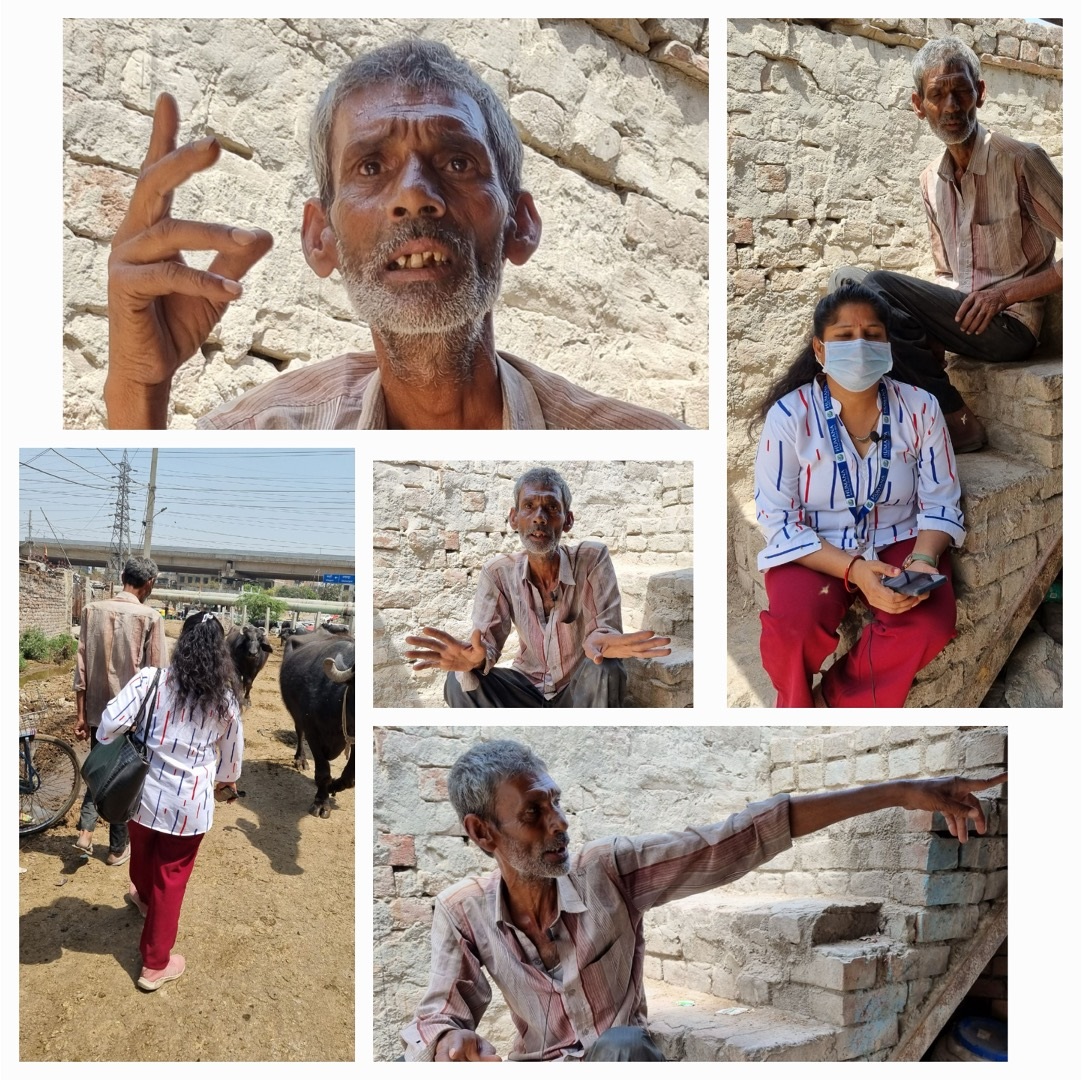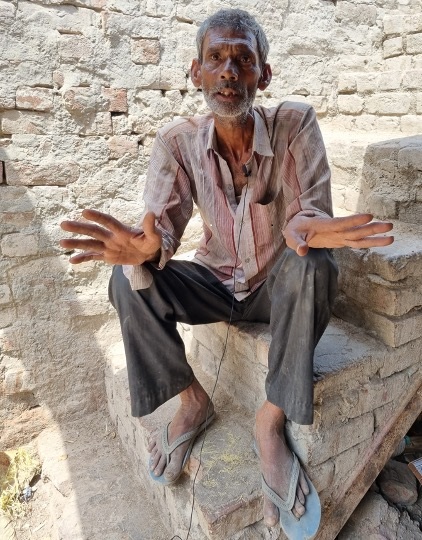Surviving Against the Odds: The Journey of Surendra — a Homeless TB Survivor in Delhi

Shobha Shukla, Bobby Ramakant
New Delhi: After enduring debilitating tuberculosis (TB) symptoms for over a year, a migrant homeless man received life-saving assistance from a community health worker. Thanks to timely intervention, he was eventually diagnosed with lung TB, started treatment, quit alcohol and even survived one of Delhi’s worst floods during his recovery, ultimately achieving a cure.
Surendra migrated to Delhi from Bihar, seeking livelihood opportunities. Over the years, he worked as a cycle rickshaw puller, in a school, and eventually settled as a ragpicker. He now resides in a temporary slum along the Yamuna River in East Delhi with his partially paraplegic wife, making ends meet through rag picking.
“I was an alcoholic and a bidi smoker. Regular consumption of booze and chain smoking took a toll on my health, which started deteriorating. I lost my appetite, became weak and could not even lift a glass of water. I lost weight, coughed incessantly, had a fever and my body ached. It was hard to walk even a few steps without support. My neighbours suspected TB and urged me to seek treatment at Pushta, threatening to evict me from the slum. However, I lacked the strength to go to a clinic on my own. My wife, physically incapacitated herself, could not assist either. I suffered like this for over a year,” he said.
Impact of Community Health Workers
One day, while mapping the area for active TB cases, Priyanka, a frontline community health worker and Field Officer at Humana People to People India (HPPI), encountered Surendra in his dire condition. He was too weak to stand due to coughing, fever and extreme weakness. Based on her field experience, she suspected TB.
After counselling, he agreed to undergo a TB test. The health worker provided him with a container for collecting his morning sputum. The next day, she accompanied him on a cycle rickshaw to the nearby TB clinic at Shastri Park Hospital, as he was unable to walk even short distances.
Despite WHO’s recommendation to provide molecular tests upfront for all presumptive TB cases (as microscopy is less effective), Surendra initially underwent sputum microscopy, which yielded a negative result. However, his X-ray indicated presumptive TB. Following clinical evaluation, doctors promptly initiated TB treatment.
Surendra’s TB drug susceptibility test using Line Probe Assay (LPA) ensured the medication was effective against his TB strain, and his HIV test was negative.
Since he was too weak to stand on his own, the health worker stood on his behalf in long queues at the hospital to collect his medications, ensuring his treatment could commence promptly.
She then counselled him on the importance of taking his three pills daily, the significance of treatment adherence, nutritional support and other health and treatment-related literacy issues.
Priyanka also informed him about the government of India’s nutritional support program, Ni-kshay Poshan Yojna, through which he could receive Rs 500 monthly during his TB treatment. She assisted him with the necessary paperwork to ensure he could avail of this benefit.
Aware of the potential for lung TB to spread to others, his wife was counselled to consider undergoing a TB test, which she did and tested negative.
Surendra’s Challenging Journey
Initially, he experienced severe side effects from the TB medication, often feeling dizzy after taking his pills. After consulting with his doctor, his medication was adjusted, and the side effects gradually subsided.
The next hurdle was his alcohol addiction. He was informed that he needed to quit it if he wanted to recover from TB. Initially resistant, Surendra believed it was impossible for him to stop. He was firmly warned that TB treatment would be ineffective otherwise, risking his life. This stark reality prompted Surendra to promise to try quitting. Eventually, he succeeded.
“Madam (Priyanka) went through a lot to get me started on treatment. I knew I had to stop drinking to get better. It was not easy — I even went to buy liquor once but changed my mind. I returned home, drank water and decided to quit for good,” he shared.
Gradually, his health improved. He regained strength and resumed walking and lifting weights as part of his rag picking. Soon, he could collect his medicines with his 10-year-old grandson. His neighbours’ attitudes also changed; they no longer discriminated against him.

However, more challenges lay ahead. In mid-2023, Delhi faced one of its worst floods in decades due to heavy rains. Like many homeless people, Surendra and his wife were swept away by the floodwaters.
“I lost everything in the floods — my documents, medicines, everything. I was carried far and nearly drowned. It was Priyanka who found me unconscious on a bridge. She arranged new documents, medicines and even food for me,” he recalled.
Priyanka had searched tirelessly for Surendra and eventually found him days later, unconscious and shivering under a plastic sheet in a distant area.
“I used to check on Surendra daily at first, then weekly as he improved. When I went looking for him during the floods, the area was inundated. People said many were washed away. After three days of searching, I found him in bad shape but was relieved I found him at all. I showed his photo to people lying on the road, and one pointed me in the right direction. There he was, wrapped in plastic, unconscious. I woke him and assured him I would help,” she recounted.
She immediately rushed to the TB clinic at the Shastri Park Hospital, explained his plight to the doctor and healthcare staff, who promptly provided his medications, arranged new documents and even provided a Poshan Potli (food bag). She also arranged clothes for him.
Priyanka’s unwavering support revived Surendra.
“I owe my life to madam. She got all my tests done, collected my medicines and supported me when I could not stand in line. She gave me courage, and I regained my confidence. I took my medicines religiously, quit alcohol and never looked back. Thanks to her, I completed my six-month treatment and beat TB,” Surendra expressed gratefully.
Even after treatment, he contacts Priyanka for nutritional support when needed.
Although he eventually received same-day testing and treatment, it came a year too late. He began his TB treatment in August 2023 and completed it in February 2024. Early diagnosis remains crucial to prevent TB transmission, reduce suffering and ultimately end TB.
Surendra has since become a TB advocate in his community, raising awareness and urging anyone with TB symptoms to seek help.
“If you want to recover, you must quit alcohol. If you have symptoms like coughing, fever or weight loss, get screened for TB. Take your medicines as prescribed, eat well and finish your treatment. People like madam (community health workers) are crucial — they listen, help and save lives,” he advised.
Priyanka is gratified that she could save Surendra, who had lost all hope. She empathizes with the homeless and marginalized, saying, “Some people have no one to care for them or navigate the health system. A little help from us can make a big difference. I urge all TB patients to take their medicines, eat well and complete treatment. Together, we can defeat TB.”
Reaching vulnerable populations like Surendra is a formidable task. Priyanka’s work at Humana People to People India under the LEAD project, supported by USAID and JSI Research and Training Institute in collaboration with India’s National TB Elimination Programme, aims to find TB in such populations and connect them to healthcare.
(The story has been sourced from Citizen News Service)
